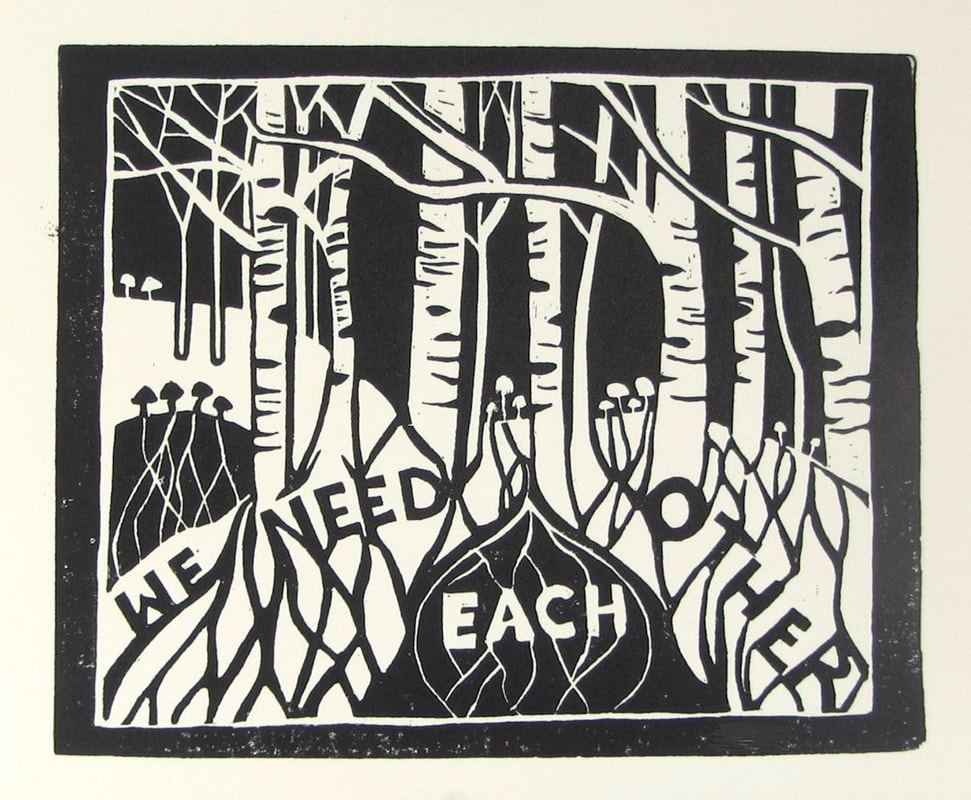The Living Room: An intentional community of healing
The Living Room: An intentional community of healing
Our origin story
The Living Room arose out of many years of dialogue among social justice committed therapists in Seattle, Washington. Some of us were part of the group Therapeutic Justice Project, a coalition of social justice healers that ran from 2008-2011. We wanted to nurture a supportive space where humans have room to breathe and to heal. We talked about what our ideal practice setting would look and feel like, and decided it would feel like a living room - a place where gatherings could happen, both spontaneously and formally, for learning, dialogue, support and liberation. The Living Room is the incubator project for that space. Since our inception in 2016, humans, practices and learnings have moved through and shaped us. Our ethos is both enduring and emergent.
The work we are called to do
We are a group of politicized healers who offer psychotherapy to individuals, relationships, families and groups,
We offer consultation and supervision to support other practitioners particularly around somatic and liberatory practice.
We host opportunities for practitioners to come together to learn from and with each other and connect around a range of anti-oppression, decolonial, liberatory topics.
We participate in and facilitate race based caucusing to do the work of healing from and dismantling internalized and external white body supremacy and late stage capitalism.
We hold space for meetings, groups, community organizing, workshops, brunches, pot lucks and dance parties.
What we are moving towards
We envision a future where liberation is not fought for but enjoyed by all. Where dignity, joy and abundance are birthrights. A world our ancestors would be proud of and our descendants will want to inherit. A world where solidarity replaces supremacy. We dream of a tomorrow where communities have capacity for rupture and repair, accountability, reparations and rematriation. Where individualism and competition are alchemized into collective mutual care and right relationship. We envision the healing work we do today as essential to this transformation.
Values we hold
Right relationship: presence, authenticity, transparency, accountability, reciprocity, capacity, compassion, positive regard, playfulness, love. Moving toward right relationship with ourselves, each other, our ancestors and descendants, the earth, and our more than human kin.
Embodied: recognizing that trauma lives in the body and is healed through the body; reconnecting with our bodies; engaging in somatic practices of collective liberation.
Complexity: emergence, adaptation and creativity; sitting with contradiction; multiplicity of tactics. Acceptance that there is no one ‘right way.’
Collective: trauma is collective and so is healing. Breaking out of the individualism that modernity imposes and relies on, including individual focus on “wellness.”
Leader-ful: flattening (not flipping) hierarchy; recognizing that leadership does not equal supremacy; sacred stewardship; welcoming everyone’s gifts; rotation of responsibilities; dispersed power as shared empowerment; checking in and course correcting as needed.
Anti-capitalist: moving away from contracts, transactional relationships and property ownership. Moving toward trust, reciprocity, consent, accountability, transparency, and shared resources (the commons).
Abolitionist: not just prisons, but all the ways that we police, imprison, and criminalize each other and ourselves.
Anti-apartheid: interrupt complicity with regimes that violate human rights; disinvest from spaces and organizations that contribute to or profit from apartheid regimes and grave human rights violations; solidarity with communities struggling toward liberation.
Decolonial: disrupt the “normality” of colonial and white supremacist patterns of thinking, feeling and relating, including how these show up in mainstream psychology and mental health; deepen relationships with the earth and more than human kin; grapple with settler colonial identities, ancestry, and how we benefited from and continue to be complicit with these oppressive systems and histories; support land back and restoration of Indigenous rights. (This is work for all of us.)
(Re) Indigenize: linguistic and cultural revitalization; ceremony; land based practices and land defense. Embracing stories and storytelling and the time it takes to transfer sacred teachings. (This is work for Indigenous people but/and can be supported by non-Indigenous folx.)
Liberation: freedom from external oppressive systems and internal limiting beliefs; ease, creativity, access, choice; centering both anti-racist and decolonial practice, both Black and Indigenous liberation, while also holding that all our liberation is tied together.
Solidarity: being with the truth that all systems of oppression are inextricably linked, and disrupting the conditions that divide us. Resonance and co-conspiring.
Enduring commitment: to our own healing, to each other, to this work and to liberation.
Lineage
Resmaa Menakem, Leticia Nieto, Sage Hayes, Bayo Akomolafe, Vanessa Machado de Oliveira, Tada Hozumi, Dare Sohei, Rev. angel Kyodo williams, Duwamish Solidarity Group, Isabel Wilkerson, Nkem Ndefo, Rae Johnson, White Awake, Holistic Resistance, Wake Up Seattle, Somatic Experiencing, Ritual as Justice School, Rachel Martin, adrienne maree brown, Ibram X. Kendi, Eric Ward, Lyla June Johnston, Natalie Wynn, S. Bear Bergman, Wendy Elisheva Somerson, Leslie Feinberg, Emma Goldman, T. Thorn Coyle, Prentis Hemphill, Janis Bohan & Glenda Russell, Laura Brown, Susan Raffo, Char Sundust, Heather Cole Gatto, Dariusz Rawa.

Tu B'shevat
Wendy Elisheva Somerson https://wendysomerson.net/ https://www.etsy.com/shop/CorvidCrossingStudio |
Land Acknowledgment
We are practicing on the traditional land of the first people of Seattle, the Duwamish People past and present, and honor with gratitude the land itself and the Duwamish Tribe. In this acknowledgement, we name our positionality. Many of us are white settlers on unceded territory after the breaking of the Treaty of Point Elliott in 1855. And all of us are visitors on this land. We are actively working towards rematriation, including paying monthly Real Rent Duwamish. We state this land acknowledgement, in part, to make visible the ongoing project of settler colonialism on this land and around the world. May the land and the Duwamish people thrive into the future. May our work be in service to our capacity to be in right relationship with each other, with the land, and for the healing of us all. |